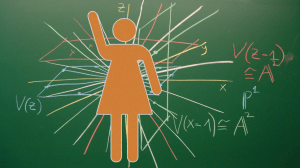Why Doesn’t Grandma Understand Me?
I was chatting about the Spring weather, which finally arrived in Boston, with a patient I saw in clinic this week. He appeared perfectly normal and mentioned how he was excited to get back out on the golf course. But when we began to discuss specifics of golf and other matters, it was clear that he was not able to understand many of the words I was using.

source wikimedia commons
All About Empathy
- Empathy is the experience of understanding another person's condition from their perspective. You place yourself in their shoes and feel what they are feeling. Empathy is known to increase prosocial (helping) behaviors. While American culture might be socializing people into becoming more individualistic rather than empathic, research has uncovered the existence of "mirror neurons," which react to emotions expressed by others and then reproduce them.
All About Personality
- Questions of personality have vexed mankind from the dawn of personhood: can people change? How do others perceive me? What is the difference between normal and pathological behavior? One's personality is so pervasive and all-important that it presents a clinical paradox of sorts: it is hard to assess our own personality, and impossible to overlook that of others.

source wikimedia commons
A study published in 1996 provided compelling evidence that our semantic memories—our knowledge of words—are stored in the temporal lobes of the brain. The temporal lobes are next to your temples, just behind your eyes. The study found that patients with strokes that damaged the temporal lobe had trouble naming people and objects. Moreover, when the damage was in the front part of the temporal lobe, closest to the eyes, there was the greatest difficulty in naming persons. When the damage was in the back of the temporal lobe, near the back of the head, there was the most difficulty in naming tools—that is, man-made objects. Those who had damage in-between, in the middle of the temporal lobes, had the greatest difficulty naming animals. This study also examined which parts of the brain were activated when individuals were asked to name people or animals or tools. As you may have guessed, they found the same pattern of activation in the temporal lobe: Naming people activated the front, naming tools activated the back, and naming animals activated the middle.